by Eva Jones
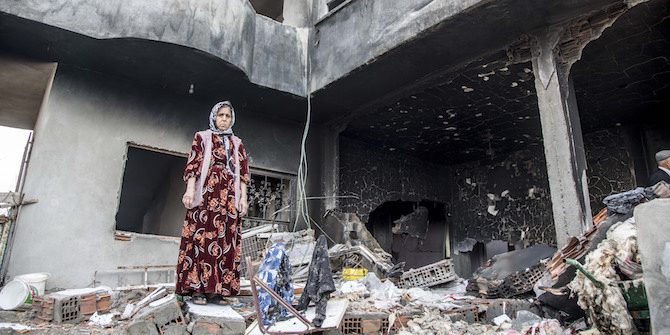
The south-eastern region of Turkey sits at the heart of the Syrian humanitarian emergency, hosting a large part of the more than three million refugees in the country and having thus become a hub for the operations of international non-governmental organisations (INGOs). In parallel, Turkey has become gradually more authoritarian since Erdogan’s election in 2003, reaching a peak when the state of emergency was declared after the attempted coup in July 2016. This occurred one year after two major events that marked a turning point in Erdogan’s approach towards the Kurdish minority: the June 2015 election, when the pro-Kurdish HDP party became the third largest in parliament, preventing Erdogan’s AKP from consolidating its hegemony; and the end of the peace process between the state and the Kurdish PKK. The escalation of violence in the south-east entailed severe human rights violations, particularly in those towns under curfew. In 2017 the conflict reached one of the most deadly peaks since the 1980s, causing the displacement of between 355,000 and 500,000 people, mainly Kurdish.
The renewed internal conflict entailed enormous challenges for national and international organisations operating in Turkey, many of which were expelled or outlawed under the auspices of the state of emergency. Moreover, Turkey perceives the establishment of the Rojava cantons in the north of Syria as a threat to its national integrity, as political independence for the Kurdish region in Syria might motivate the Kurds in Turkey to demand the same. INGOs with programmes in northern Syria, such as Mercy Corps, have been accused by Ankara of cooperating with the Syrian Kurdish YPG, and have thus been outlawed in Turkey. INGOs and foreign aid workers have been framed in public discourse as part of a parallel structure plotting against the state. Nevertheless, on several occasions these charges have not been supported by any evidence, and the closing decrees were not followed by any investigation.
If many CSOs and INGOs are not part of a conspiracy against the Turkish government, one might wonder why such organisations are perceived as threats to the state. The findings below are the result of interviews conducted in south-eastern Turkey with national and international organisations, between June and July 2017. The practitioners interviewed during this fieldwork, all of whom asked to remain anonymous for their security, highlighted three main reasons.
Firstly, many organisations challenge the government’s conservative ideology, denouncing its Islamist and authoritarian tendencies and defending the rights of minorities. This approach often dovetails with the agenda of the HDP, which advocates for democracy, pluralism and human rights. In response to this ideological threat, the government has attempted to shape the structure of civil society by supporting pro-government organisations and establishing CSOs which promote a more conservative and Islamist ideology. Secondly, the government is afraid of losing control over massive amounts of foreign funding channelled through INGOs, especially after a proposed €6 billion ‘migrant deal’ was signed with the EU. The Turkish state is able to access a share of the budget when an organisation is shut down, as the organisation’s remaining funds are transferred directly to the state and are then managed by its Disaster and Emergency Management Authority (AFAD). Some CSOs claim that the AFAD is extending its control over civil society actors and thus monopolising the field. Thirdly, many interviewees argued that CSOs and INGOs pose a threat to the government as they might witness and report on the state-led violence in the south-east. For instance, Gündem Çocuk, an NGO advocating for children’s rights, was shut down shortly after having co-authored a report which condemned violence in the city of Cizre.
Chaos and Fear
The state of emergency in Turkey, issued after the attempted coup in July 2016, has been renewed every three months since then, as the government declares that threats to national security persist. This has allowed the establishment of what Agamben defined as a ‘state of exception’, which is a zone of anomie where the rule of law is suspended, but where the government can claim to act lawfully within the establishment of emergency laws. In particular, the state of emergency made the regulatory framework for INGOs more chaotic and uncertain. The legal status of foreign organisations had always been opaque in terms of defining the requirements for registrations and work permits. Nevertheless, this issue had not caused problems for the first few years of the humanitarian response to the Syrian crisis, which allowed many organisations to operate within a blurred legal framework. After the coup attempt, however, the government’s approach changed drastically and unclear legislation was used to justify repression of NGOs. In Gaziantep, for instance, practitioners were detained for having work permits from different provinces. Moreover, unclear regulations have been used to impose a selective crackdown: conservative CSOs are supported by the government and are often favoured by fiscal benefits, and selected organisations are still allowed to operate if they demonstrate their caution in not supporting ‘terrorist groups’.
Moreover, the state of emergency allows the establishment of a state of fear, where humanitarian organisations operate in an environment of constant intimidation. NGOs are aware that their operations and communications are constantly being monitored, and that anyone can be arrested on charges of terrorism without the need of evidences. The sense of fear established under the state of emergency consolidates the power of the government and spurs a sense of mistrust among NGOs and citizens.
Implications for refugees and IDPs
The effectiveness of the humanitarian response to displacement in Turkey is being limited by the expulsion of foreign organisations from the development arena, as many small NGOs benefit from the knowledge, expertise and funding of INGOs. Moreover, the state of fear entails a ‘chilling effect’ which condemns rights-based organisations to deep self-censorship as a vital compromise. One practitioner from a human rights organisation said that they planned to conduct research in the south-east, but had to stop their work as they ran the risk of being outlawed. Moreover, the government favours organisations focused on the provision of aid rather that those doing rights-based advocacy: for instance, the Humanitarian Relief Foundation (IHH) is a service-oriented NGO ideologically in line with the government that has grown exponentially in recent years. When the organisations’ space of action is limited to the delivery of material assistance, beneficiaries will lack access to complementary services, such as community centres, that might positively affect their livelihoods. Many interviewees argued that the monopolisation of aid under governmental agencies such as AFAD would dramatically reduce the quality of assistance.
The closing of INGOs and NGOs in Turkey has had severe impacts on the population in need’s access to aid. For instance, practitioners working in the South-East described how their organisation had to conduct household needs assessments through phone interviews, as they could not get a government permit to conduct field research. In particular, it is impossible for humanitarian organisations to reach IDPs or assess their needs. One aid worker reported that their organisation was approached several times by IDPs asking for aid. After long debate they decided not to provide them assistance, in order not to run the risk of being labelled terrorist supporters by the government.
It is clear that the politically-motivated crackdown on relief organisations has severe humanitarian implications, particularly as it entails not only the burying of IDPs’ needs, but also the full denial of their existence.
This is an abridged version of a paper given at a conference on Responses to Displacement in the Middle East, held at the LSE on 30 November 2017. See below for the full list of papers.
Eva Jones has an MSc in International Development and Humanitarian Emergencies from LSE, and a BSc in Economics from the University of Milano Bicocca and Yildiz Technical University in Istanbul. She recently conducted field research in southeastern Turkey and has worked for international humanitarian organisations in Lebanon and the UK.
In this series:
- Introduction by Zeynep Kaya
- The Politics of Return in post-ISIS Iraq by Kyra Luchtenberg
- Going Back or Staying Better: Processes of Return After Displacement due to ISIL by Nesreen Barwari
- Returnees in Syria: Sustainable reintegration and durable solutions or a return to displacement? by Schadi Semnani
- Breaking the Vicious Circle: Exploring Alternatives to Current Responses and Solutions to Internal Displacement in Yemen by Stean Auguste Tshiband
- Iraq after the Islamic State: Displacement, migration and return by Irene Constantini
- Displaced and on the Move Again: Decision-making among IDPs who migrate to Europe by Megan Passey
- Violence, Insecurity and the (Un)making of Rukban Camp by Suraina Pasha
- Between International Influence and Domestic Politics: The case of the refugee control policy towards Syrian refugees in Lebanon by Zad El Hage Sleiman
- Fleeing Home at Home: Internal Displacement in Homs, Syria by Ammar Azzouz and Irit Katz
- A Phenomenological Exploration of the Gendered Vulnerabilities of Internally Displaced Syrians by Jaclynn Robinson
- Administrative Violence and Palestinian Displacement in West Bank Area C by Mustafa Fatih Yavuz
- Local Integration in the Context of Protracted Displacement Inside Syria by Simon Verduijn



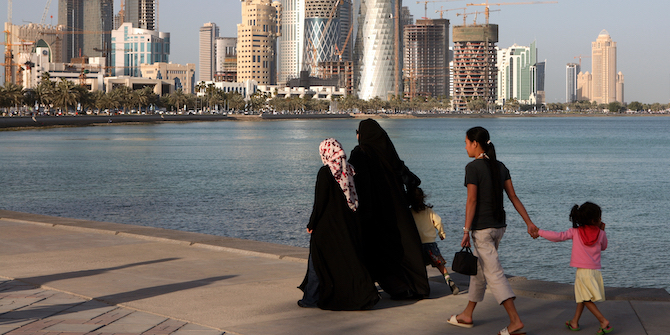
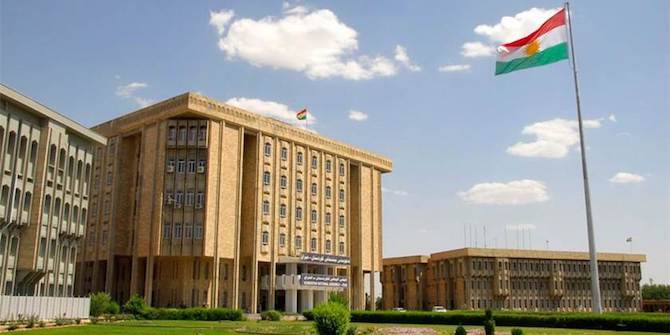
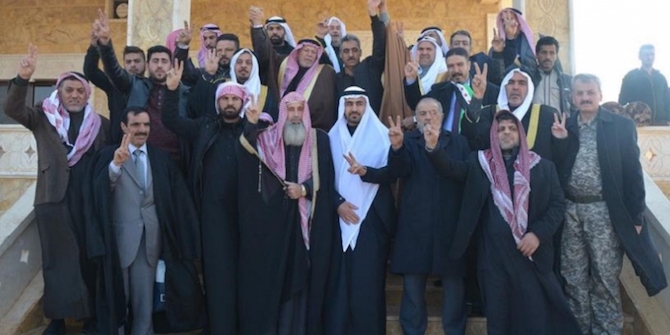
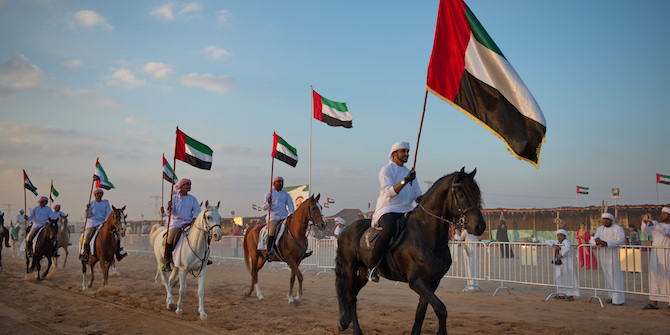
1 Comments